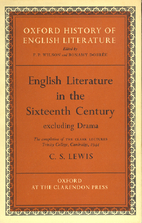C. S. Lewis in his autobiography, Surprised by Joy, made a statement that startled many when he said, “I do not much believe in the Renaissance as generally described by historians. The more I look into the evidence the less trace I find of that vernal rapture which is supposed to have swept Europe in the fifteenth century.” And in a letter to his friend Sister Penelope in 1952 he leaves no doubt with respect to his views of the Renaissance: “I have been given a year’s leave from all teaching duties to enable me to finish my book on XVIth century literature, so I am plugging away at that as hard as I can. My hope is to kill some popular mythology about that fabulous monster called ‘the Renaissance.’”
This is one of the subjects I tackle in my upcoming book on Lewis and his views on history. Let me share a bit from my proposed chapter on this topic.
We might start by asking why Lewis referred to the Renaissance as a “monster.” Perhaps Lewis had Frankenstein’s monster in mind when he used the word, as that monster was created by incorporating many other things into its being. As we begin to look at what Lewis says of the Renaissance in his English Literature in the Sixteenth Century, that comparison might be more apt than it seems on the surface. With the word “Renaissance,” Lewis apparently has no real objection. As long as it is defined merely as a general revival of learning with an emphasis on Greek and Latin, he has no problem with it. That would be a clear definition and could be useful. Unfortunately, in Lewis’s estimation, it has come to mean much more, cobbled together in a somewhat similar way as Frankenstein’s monster.
The meaning of the word has become so widened, he opines, that it has become “‘an imaginary entity responsible for everything the speaker likes in the fifteenth and sixteenth centuries.’” Keep it as only a chronological entity and it may be harmless, but nouns tend to stoke the imagination to the point where we begin to imagine that the noun is a thing in itself. People apply the word Renaissance to impose a kind of unity, Lewis says, on a variety of events taking place in those centuries. That is where it turns into an imaginary concept, he believes. Every event becomes part of the “thing” called the Renaissance. The Renaissance as an entity now takes on the nature of the pantheistic conception of a deity that is incorporated into everything.
Then, as every attempt to define this mysterious character or quality turns out to cover all sorts of things that were there before the chosen period, a curious procedure is adopted. Instead of admitting that our definition has broken down, we adopt the desperate expedient of saying that “the Renaissance” must have begun earlier than we had thought.
Lewis considers this definition an absurdity as it then incorporates Chaucer, Dante, and St. Francis of Assisi as Renaissance men. When a definition becomes that broad it loses all real value.
Humanists of the Renaissance era draw Lewis’s special attention. On the one hand, he does recognize that they were responsible for the recovery of many ancient texts. Lewis is not trying to erase the influence of the humanists from history, but he also points out that their influence wasn’t always what conventional wisdom believes. In particular, he accuses them of such a devotion to classicism that they played little to no role in the great English literature of the century he researched. If humanism in England had been more powerful in the Elizabethan age, he fears it would have prevented that literature from coming into being. The humanists’ dislike of medieval times led them to label anything written during those centuries as “barbarous.”
One of the biggest problems with the humanists’ vision was their belief that truly elevated writing had to imitate the classical Latin; anything else was unsophisticated—therefore, the writing of the Middle Ages was beneath educated men. Lewis, though, had an answer for that perception: “Elevation and gravity of language are admirable, or even tolerable, only when they grow from elevation and gravity of thought.” To attempt a shortcut is artificial and can be found in any school where boys “can be taught to write Ciceronian prose. … When medieval literature is bad, it is bad by honest, downright incompetence. … But the varnish and stucco of some neo-Latin work, the badness of which no man could incur by sheer defect of talent but only by “endless labour to be wrong” is a new thing. Lewis concludes that the literature of the sixteenth century was not influenced much by Greek literature. His summary of the views of the humanists is succinct: they hated the Middle Ages.
I have much more to say about this in the upcoming book. The tentative title, by the way, is Many Times & Many Places: C. S. Lewis and the Value of History. I hope this short blog post has piqued your interest.



